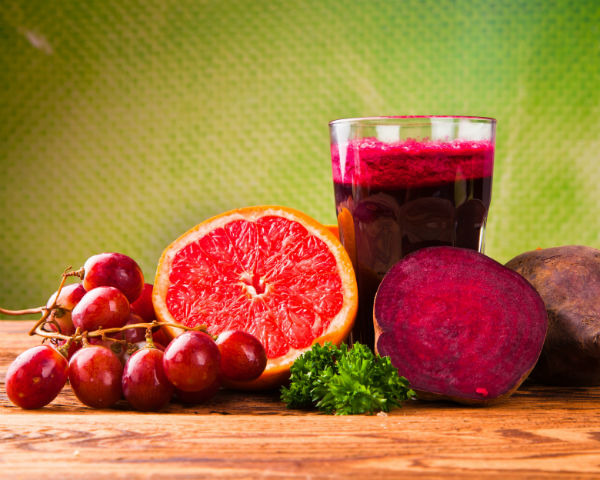Dr. Verma's Verdict: Juice Cleanses — Hype Or Healthy?
At this point, everyone has heard about juice cleanses: advertisements promise easy weight loss, celebrities tout juicing's instant health benefits, and magazines assure you that drinking nothing but fruit juice for weeks on end will lead to gorgeous, glowing skin. But we all know that fad diets are about as trustworthy as late-night infomercials, and you're right to be skeptical about the validity of these claims.
So, do juice cleanses work? Are they good for you? Let's start with defining the basics: juicing is the process of extracting juices from fresh fruits and vegetables, often discarding the fiber or pulp, a product that can be achieved by using a juicer. Before I tell you my medical opinion on whether you should do a juice cleanse or not, I want to clear up some misconceptions: essentially, not all juicers are created equal. There are several kinds, some of which blend juices that are healthier for you than others. So how do you know which type to choose? I can break juicers down into three categories:
Fast juicers use centrifugal force to crush the fruits and vegetables, extract the juices, and separate the pulp into a separate compartment. Slow juicers, on the other hand, work in two steps by using gears: the fruits and vegetables are pulverized, but while the juices are extracted, some of the pulp is retained, thus making for a thicker drink. Lastly, there are whole food juicers: these are basically state-of-the-art blenders, like Blendtec or Vitamix, which crush and blend the fruits and vegetables into a liquid. Every part of the fruit and vegetable is retained, nothing lost.
The process of fast and slow juicing doesn't make sense from a health perspective: simply extracting the juices and throwing away the pulp is like buying a velvet bag of gold, keeping the bag, and discarding the gold: it is an utter waste of valuable material. Whole food juicing really is the way to go. Whole juices contain more vitamins, minerals, and good carbohydrates simply because no element of the produce gets discarded. Most of the nutrients in fruits and vegetables are in the skin and thicker parts, all of which get discarded during the process of traditional juicing. The fiber content is higher in whole juices as well. Overall, there is much more bang for your health, not to mention buck, when you choose to whole juice.
I do not believe juicing should be exclusively done for weight loss and detoxification. We should all be consuming somewhere between five and 13 servings of whole fruits and vegetables daily, however, so incorporating more fruits and vegetables via whole food juicing can be very beneficial to your overall health.
Of course, you can jump-start weight loss if the only thing you are consuming is juice, but it comes at a cost: our bodies cannot be sustained on just fruits and vegetables for long periods of time. We need fat, protein, and an adequate caloric intake to survive. On a juice cleanse diet, only water weight is shed as glycemic stores are broken down in the body; once you start eating again, the weight comes back on. Additionally, by following a juice-exclusive diet, you are inevitably altering your gut microflora. In order to keep your 100 trillion gut microbes happy, you need to consume a well-rounded diet.
While the benefits of juicing are extolled by some celebrities — making it all the more appealing to us common folk — would-be juicers need to be careful about which kind of juicing they choose. If you're going to juice, be a whole food juicer: this is a great way to incorporate fruits and vegetables that may normally unpleasant for you to consume, like beets, spinach, kale, and cabbage. When blended, they virtually become unnoticeable, especially when combined with an endless combination of more palatable fruits and vegetables. If you have trouble getting in your minimum serving of fruits and vegetables daily, struggling to eat salads or munch on fruits and vegetables as healthy snacks, investing in a blender designed to whole juice will be one of the best things you ever did for your body.
I personally own a Blendtec whole food blender. I chose that over a WaveRunner for my 35th birthday, and have never regretted it. To think about the insane money I have saved by not buying those trendy bottled juices or drinks from juice bars! The blender paid for itself after about 30 uses. Every day, I make a whole juice concoction of beets, spinach, carrots, apples, berries, grapes, pineapple, kiwis, and whatever else I feel like throwing in: it's a required part of not only my daily diet, but my three boys' diets, as well: they like to call it Mommy's SuperJuice.
Special Contributor Deepa B. Verma, MD, ABIHM, is double board certified in family medicine and integrative holistic medicine. Her practice, Syngeristiq Integrative Health, is located in Clearwater, Florida. When she is not busy raising and playing with her three boys, she enjoys music, the beach, healthy cooking, reading, and exercising.
